Time to outlaw the wildlife pet trade
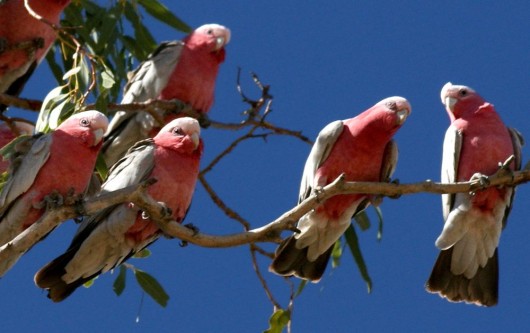 Australian native Galahs
derived from indigenous Yuwaalaraay word ‘gilaa‘
(Eolophus roseicapilla)
Just because Galahs are currently abundant, gives no-one the right to steal them and imprison them from the wild
Australian native Galahs
derived from indigenous Yuwaalaraay word ‘gilaa‘
(Eolophus roseicapilla)
Just because Galahs are currently abundant, gives no-one the right to steal them and imprison them from the wild
.
Wildlife does not exist so that it may be petted!
Wildlife exists for its own right, as members of fragile yet disappearing ecosystems, defying the hand of humans. Many humans are not content to observe and respect wildlife in their native habitat. Such folk are anthropocentric, wanting to own wildlife as property and label them as ‘pets‘.
The mindset is as backward as colonial Europeans once owned Black slaves. Such anthropocentric thinking folk would not have a clue about the concept of ‘ecology‘ where humans are part of the environment, but instead control and dominate it. Such folk may even naively only comprehend the term to be that recently hijacked by Information Technologists – in the realm of commerce.
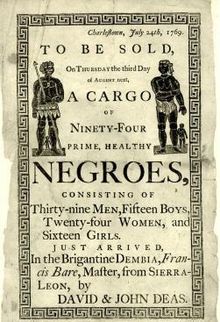 The Atlantic Slave Trade once was Legal
…doesn’t mean it was right, just culturally acceptable
The Atlantic Slave Trade once was Legal
…doesn’t mean it was right, just culturally acceptable
.
While 21st Century society mostly has morally matured:
- to abolish the Slave Trade
- to respect the rights of Children
- to respect the rights of Women
- to respect the rights of Indigenous peoples
.
.. still the Wildlife Slave Trade persists in 21st Century society, as if somehow it is morally distinguishable from the Human Slave Trade.
No law has yet legitimised this distinction. Instead, society relies upon prevailing socio-cultural norms to allow the immoral trade in wildlife to persist.
This is unacceptable.
Humans breed wildlife and keep wildlife as pets for their own gratification, not for the benefit of wildlife per se. Pet shops are permitted by the Australian Government to keep and sell wildlife as pets such as native birds, native reptiles, native marsupials and native Dingoes. Animals are excluded from the Crimes Act. But this is no different to excluding Australian Aborigines from criminal law during early colonial Australia up until 1838 (Myall Creek Massacre). It is no different to the use of child labour during the Industrial Revolution, nor any different to the patriarchal prejudice assigning women less rights somehow than men.
It is ‘moral exclusion‘, like when soldiers before battle are conditioned to dehumanise the enemy in order to psychologically distance themselves from selected humans to permit massacring other humans with impunity. Such ‘dehumanization‘ can make violating generally accepted norms of behavior regarding one’s fellow man seem reasonable, or even necessary (Maiese, 2003) – like the Australian Airforce helping the United States bomb the Vietnamese back into the Stone Age.
“Tell the Vietnamese they’ve got to draw in their horns or we’re going to bomb them back into the Stone Age.”
~ US General Curtis LeMay, May 1964
.
Australians witness this moral exclusion mindset being translated into Australia’s ongoing kangaroo slaughter on an industrial scale.
But sentience is sentience, a life is a life. Breeding and trading in domesticated animals is treating animals as property, like clothes and a car. Ancient Romans treated slaves as property and their ancient laws upheld their immorality.
Australia is not the ancient Roman Empire. Respect for the equal rights of humans is enshrined in Australian cultural values and laws. Yet our moral relativism judges excluding wildlife from our cultural values and laws. Why? How is this legitimate, appropriate and right? It isn’t.
Wildlife come under threat from humans from over a dozen exploitative excuses – deforestation, bushfire, poaching, etc. Wildlife smugglers and wildlife traders (‘pimps‘) make a profit from the theft, breeding and trading in wildlife. It is exploitation and is morally wrong, yet the laws do not uphold morality in the case of wildlife. When laws fail to uphold moral cultural values, civilised society is undermined. The Roman Empire may have thought of itself as a civilised society in ancient times, despite its institutionalised slavery; but in the 21st Century, Australian civilised society warrants a higher standard.
.
Dural Pet Superstore Burns Down
.
Then when a pet shop burns down killing all animals inside including wildlife, one can only imagine the suffering as the animals are burned to death, locked up inside, abandonned.
This morning at around 2am, the Dural Pet Superstore in outer north-western Sydney caught fire in an industrial complex, the Dural Business Centre at 915 Old Northern Road Dural, as a result of an adjoining commercial premises igniting. Police say the fire broke out at a tyre factory although the cause was not immediately clear.
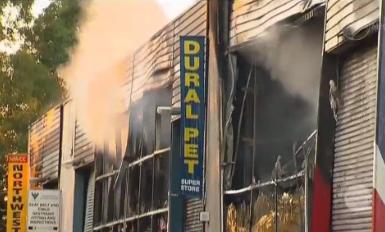 Animals being burned to death in the Dural pet shop fire
Animals being burned to death in the Dural pet shop fire.
It was the fire alarm of the pet store that alerted the fire bridage to attend, but it was too hot and too late for the amimals in the pet shop.
 Pet native reptiles for sale on the Dural Pet Superstore website
Pet native reptiles for sale on the Dural Pet Superstore websitelike our native Water Dragons and Bearded Dragon Lizards (above)
.
Inspector Ben Shepherd from the NSW Rural Fire Service said some parts of the complex, including the Dural Pet Superstore, had been destroyed.
Hundreds of animals from the store are assumed dead. The store sold rabbits, guinea pigs, chickens and budgies.
“We stock a wide range of finches, as well as young and adult budgies… we also sell quails, cockatiels, canaries, peach face lovebirds and more.”
~ Dural Pet Superstore website
 Native Galahs being offered for sale on the Dural Pet Superstore website
Native Galahs being offered for sale on the Dural Pet Superstore website
.
The store housed birds, chickens, fish and the renowned rainbow lorikeet ‘Pierre’ – who had been with the store for 11 years.
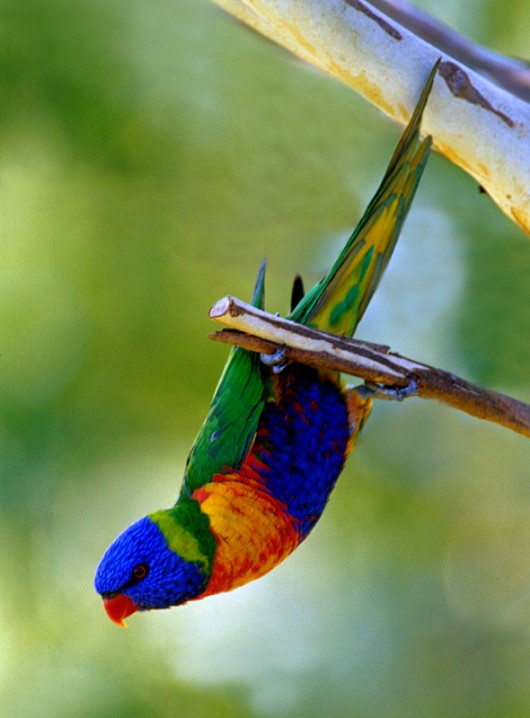 Rainbow Lorikeet for sale at the Dural Pet Superstore
Rainbow Lorikeet for sale at the Dural Pet Superstore(Trichoglossus haematodus) Native parrot of Australia and the south west pacific region
.
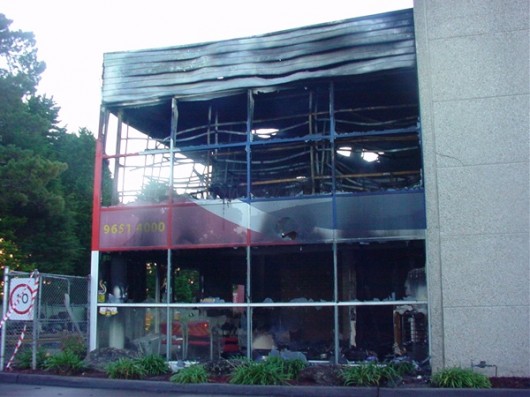 The Tyrepower Store, next to the Dural Pet Superstore
The Tyrepower Store, next to the Dural Pet SuperstorePicture by Natalie Roberts Would a creche or nursing home with unattended sleeping occupants be permitted at this location?
Typical official answer: No, animals do not have the same value as humans, so it doesn’t matter.
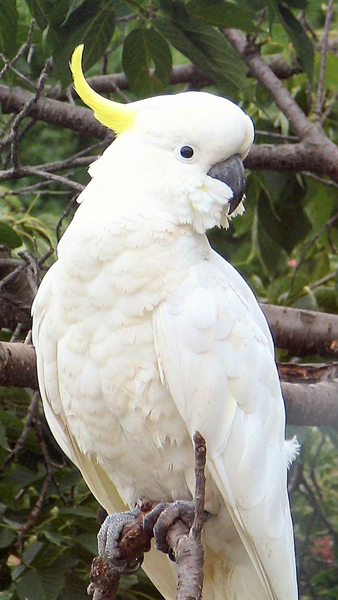 Sulphur-crested Cockatoo for sale on the Dural Pet Superstore website
Sulphur-crested Cockatoo for sale on the Dural Pet Superstore website[Cacatua galerita] Just because Cockatoos are currently abundant, gives no-one the right to steal them and imprison them from the wild
.
[Sources: ‘All animals dead as fire guts Sydney pet shop’, April 24, 2012, AAP, http://www.smh.com.au/nsw/all-animals-dead-as-fire-guts-sydney-pet-shop-20120424-1xifv.html, ^http://www.hillsnews.com.au/news/local/news/general/fire-investigation-for-dural-factory-blaze/2531860.aspx].
New South Wales Rural Fire Service spokesman Ben Shepherd said seven businesses were damaged during the fire, which included a tyre store, a mechanic and a pet store.
“There was considerable loss to the pet store and there were pets inside”,’ he said.
“The owners were visibly shaken and the business is well known for keeping fish, birds and puppies.”
Investigations into the origin of the fire will take place when the fire cools and the integrity of the building is established. Mr Shepherd said it was too early to tell if the fire was suspicious. [Ed: How qualified is the RFS in large urban fire fighting; is this not the task of the professional urban-trained Fire Brigade?]
.
[Source: ‘animals-perish-in-dural-blaze, Hornsby Advocate, 20120424, ^http://hornsby-advocate.whereilive.com.au/news/story/animals-perish-in-dural-blaze/].
Time to ban the sale of animals (especially wildlife) from pet shops
Pet shops should only be for the sale of pet food and accessories.
However, since the Australian pet shop market for live animals represents the lure of big money, ‘backstreet breeders‘ and ‘puppy farmers‘ are indiscriminately producing enormous quantities of puppies and kittens and selling them to pet shops.
The Australian Government needs to outlaw puppy farms and backyard breeders to put them out of business. Unfortunately they do trade through many Pet Shops, so Pet Shops have become a big part of the problem. We certainly recognise that Pet Shops are not the only cause of the problem. But however you look at it, there are too many animals bred and not enough homes for them all. That’s why so many are euthanased every year. Anything we can do to stop excessive breeding and impulse selling will reduce the numbers killed. Animals should not be bred for profit only to end up being killed when the money has been made.
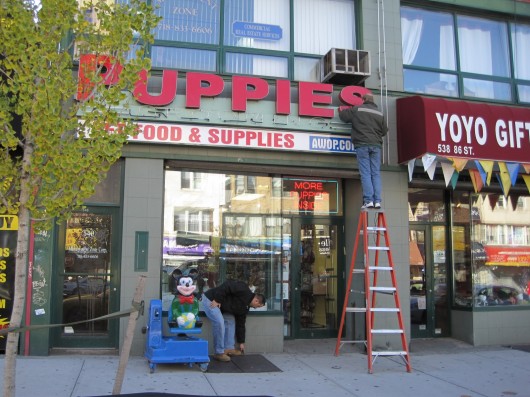 ‘More puppies inside’…pet shop in Missouri, USA
‘More puppies inside’…pet shop in Missouri, USA
.
Pet shops encourage the impulse purchase of animals by ill-informed people who later discard their pet when they realise that pet ownership is not as easy or cheap as they thought. These are the animals that end up in the pounds and many thousands are euthanased each year.
Even though statistics are difficult to obtain and are poorly kept, we estimate that 130,000 dogs and 60,000 cats are euthanased each year in Australia by animal welfare agencies. There are simply too many bred and not enough homes. This is an absolute disgrace and no humane Australian could possibly want this situation to continue.
 How much is that doggy in the window?
How much is that doggy in the window?
.
People can buy their animal companion from pounds, animal shelters or rescue centres and save a rejected animal’s life in the process!
Or visit a reputable, registered breeder. They will receive better information on the future care of their pet and be vetted for suitability as an owner.
.
[Source: Say No To Animals in Pet Shops, ^http://www.saynotoanimalsinpetshops.com/]
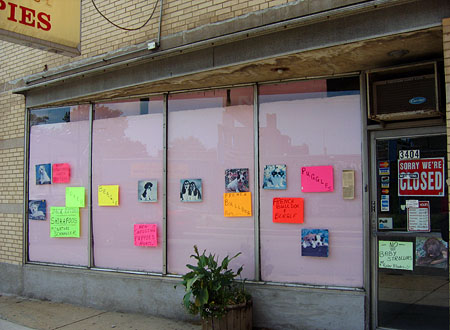 The only good pet shop is a closed pet shop
The only good pet shop is a closed pet shop
.
Further Reading:
.
[1] Royal Society for the Prevention of Cruelty to Animals (RSPCA) in Australia, ^http://www.rspca.org.au/.
[2] Royal Society for the Prevention of Cruelty to Animals (RSPCA) in the United Kingdom, ^http://www.rspca.org.uk/home.
[3] American Society for the Prevention of Cruelty to Animals (ASPCA),^http://www.aspca.org/.
[4] People for the Ethical Treatment of Animals (PETA), ^http://www.peta.org/issues/companion-animals/pet-shops.aspx.
[5] Say No To Animals in Pet Shops, ^http://www.saynotoanimalsinpetshops.com/.
[6] Aninal Liberation Victoria, ^http://www.alv.org.au/storyarchive/0712puppy/cruel.php.
[7] Paws for Action (NSW), ^http://www.pawsforaction.com/.
[8] Pet Store Abuse, ^http://www.petstoreabuse.com/links.html.
[9] Animal Liberation on Pet Stores, ^http://animal-lib.org.au/subjects/animals-as-companions/261-pet-shops-puppy-farms-and-pounds.html, Website: ^http://animal-lib.org.au/.
[10] Oscar’s Law, ^http://www.oscarslaw.org/about.php.
[11] ‘Dehumanization‘, by Michelle Maiese, Beyong Intractability (website), July 2003, ^http://www.beyondintractability.org/bi-essay/dehumanization.
Tags: Atlantic Slave Trade, dehumanization, Dural Pet Superstore, Dural Pet Superstore burns down, Galah, human slave trade, moral exclusion, moral relativism, Myall Creek Massacre, native pets, Pet native reptiles, pet shop fire, rainbow lorikeet, wildlife pet trade, Wildlife Slave Trade
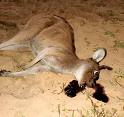
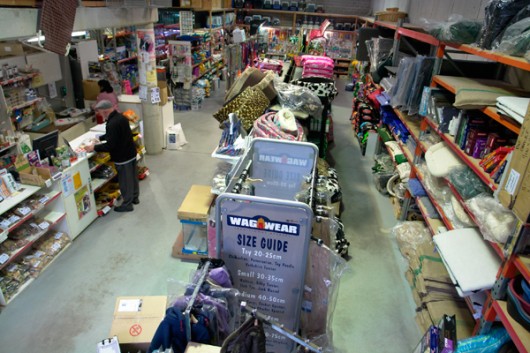

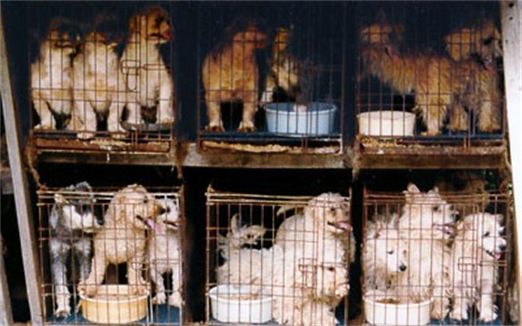
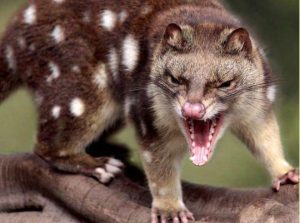

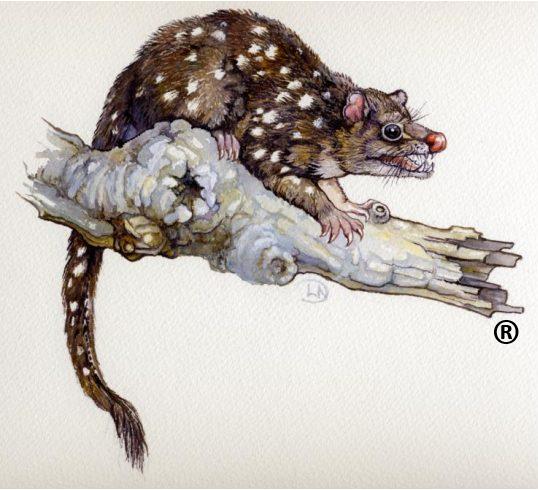
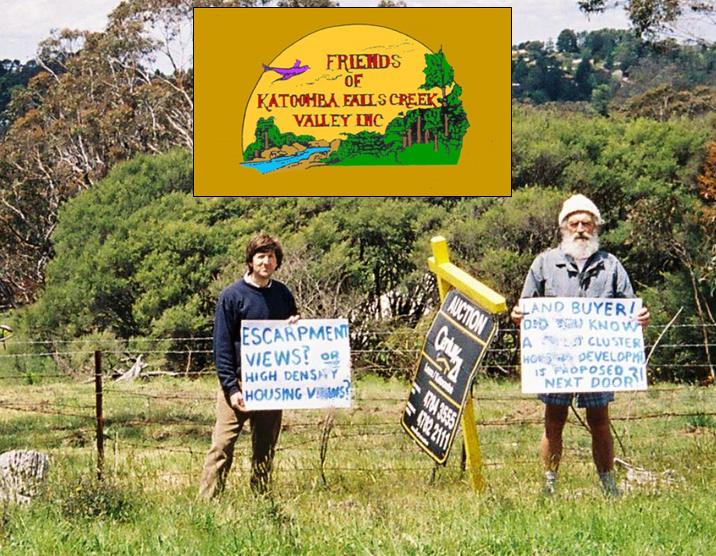
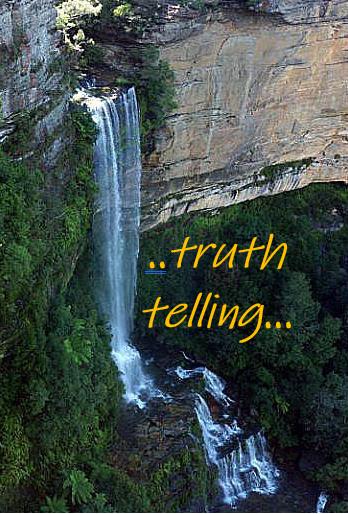
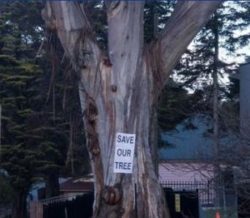


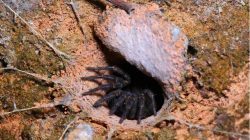

Your story is inaccurate as there were no rainbow lorikeets, galahs or sulphur crested cockatoos at the store at the time of the fire. Also no dogs or cats. I am a customer of Dural Pet Super Store and I was at the store the day before the fire.
Maybe if you had had some pets as a child you would have a better understanding of why people want to have pets. And how a relationship with a pet, as a child, can lead to a deeper appreciation and understanding of the natural world.
I fully agree with the contents of this article and would like to add:-
• that the lack of our comprehension of the fundamental ecological truth about our and our economy’s place within the natural environment (Prof. Ian Lowe in “Australia, State of the Environment 1996”, Executive summery p. 15) stems from our religious indoctrination about God creating us apart from and in control of nature and our economists’ indoctrination that we and the environment are part of and dependent on the economy. In contrast the fundamental ecological truth is embedded in Aboriginal religion, ethics and life (Rose, Deborah Bird – Chapter 15, “traditional Aboriginal Society, a Reader”, Edited by WH Edwards; MacMillan 1987);
• the exotic pet trade is also responsible for environmental damage due to its contribution to the increase in variety and number of feral animals (see invasive Species Council).
I think that Paul missed the gist of the article, as it is not against having pets but only against the trade in pets and the treatment of animals as a commodity because of the numerous adverse effects this has on the welfare of animals, wildlife and the natural environment.
Paul and Barbara respectively thank you.
This article challenges the right of people to keep wildlife in pet shops to sell as pets. It has transferable messages to all animals and recognises the subject is complex and controversial.
Barbara’s comment rightly highlights our key messages:
(1) Humanity’s place within the Nature
(2) Questioning any religious premise that prescribes humans having a god-given right to control Nature
(3) To aspire to deeper understanding of Indigenous peoples’ respect and interpretation of the integral value of Nature in human life, decision making and spirituality.
(4) To realise the systemic harmful impact of the exotic Australian native fauna, indeed driving many species extinctions.
Barbara, we apologise if we have misinterpreted your comment, but we greatly appreciate your input.
===
Paul,
Thank you for your personal update of your reported facts.
It is comforting that you personally have reported that less animals were killed in this pet shop fire than were reported in the press.
In our article, we re-quoted press reports, which we have hyperlinked referenced – so please check these press references in our article.
Paul, you also offer a view that children benefit from growing up with pets to help them “lead to a deeper appreciation and understanding of the natural world”.
We do not disagree with you.
Early ethical supervised exposure of children to animals in care serves to be vital nurturing education. It should engender a child’s empathy and respect for other creatures, indeed for other people in later life.
Our article does not critisise the value of animal pets to humans.
Rather, our article criticises the human exploitation of animals. We consider pet shops that source and sell animals and encourage animal breeding as immoral. We particularly consider that poaching wildlife to exploit as pets is immoral.
We value all life, people and animals. This article is dedicated to value of the life of..
‘the renowned rainbow lorikeet ‘Pierre’ – who had been with the Dural Pet Superstore for 11 years’ as reported in the press.
~ Ed.
One might say anything that humans do is just part of evolution. If the minority one day ever becomes the majority, then what the heck will the minority have to whinge about.
Thank you Paul, for knowing your facts and the store personally, before judging this particular pet store.
I recently started working with Dural Pet Superstore. No dogs, puppies, kittens or cats were ever sold from Dural Pet Superstore. No cockatoo’s, galah’s, lorikeets were sold at or by the store. No reptiles were ever sold by the store. The people I work with have a high respect for animals and their rights. The care, feeding, watering and cleanliness of the pets was and will be again the first and highest priority for me and my colleagues. We are all still having trouble dealing with what happened.
The Caltex had the bousers turned off and it’s Australia, they’re underground…… It would not have been a big explosion. Their attention should have been to protect the living……. and, we didn’t get to choose which Fire Fighters would cover the area….. You’re right, there’s different training for bush, grass fires than building fires.
There is no conclusive evidence where the fire started. Yet, the building’s interior was pulled out before they assessed the damage. Sorry, how are you supposed to figure out where the fire started after you’ve moved everything????
There were other calls made to the Fire Fighters before the Pet Shop’s alarm went off.
If you have a look at the site, the focus was kept at the front of the complex right, yet the very back of the building isn’t completely burnt like the rest. So where do you think the fire started??? There were seven businesses affected, but one of them had living Pets inside. We agree, the focus should have been to save the Pets.
It is wonderful to care for your pets, and animals do benefit from human companionship too. Once animals are a pet, they need the loving relationship between them and their owner aswell.
Maybe we should be protecting our wildlife from people who are taking healthy animals straight from the wild. Dural Pet store didn’t sell wildlife, they sold pets. There’s a difference.
There are many people stealing our wildlife to transport overseas. Most of these animals don’t make it alive, as they are cramped, starved and stressed. If they do make it alive, who know’s what happens to them.
Other people kill wildlife to protect their lively hood, for ‘the game’, or for an aphrodisiac, or for religion.
How many of you buy free range eggs? I mean “Manning Valley” or other REAL free Range Eggs? Not your Coles free range, with their free range being a large enclosed inside area……